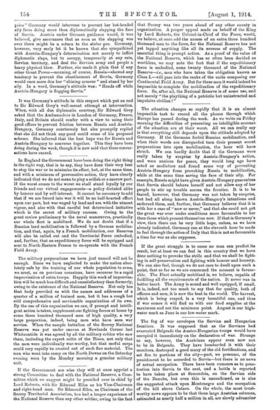The situation changes so rapidly that it is an almost
impossible task to record all the phases through which Europe has passed during the week. As we write on Friday morning the difficulties of presenting an intelligible account of the situation are at their worst. All we can really say is that everything still depends upon the attitude adopted by Germany. If the Germans forbid Russian mobilization, and when their words are disregarded turn their present secret preparations into open mobilization, the hoar will have struck. We can hardly doubt that if the Germans were really taken by surprise by Austria-Hungary's action, and were anxious for peace, they would long ago have acted as mediators and found some way of preventing Austria-Hungary from provoking Russia to mobilization, while at the same time saving the face of their ally. For example, Russia might have given Austria-Hungary guarantees that Servia should behave herself and not allow any of her people to stir up trouble across the frontier. It is to be feared, however, that Germany was not taken by surprise, but had all along known Austria-Hungary's intentions and endorsed them, and, further, that Germany believes that it is with her a case of "now or never," and that she could not get the great war over under conditions more favourable to her than those which present themselves now. If that is Germany's view, then there can be very little hope, unless, as we have already indicated, Germany can at the eleventh hour be made to feel through the action of Italy that this is not so favourable a time for war as she supposes.


































 Previous page
Previous page